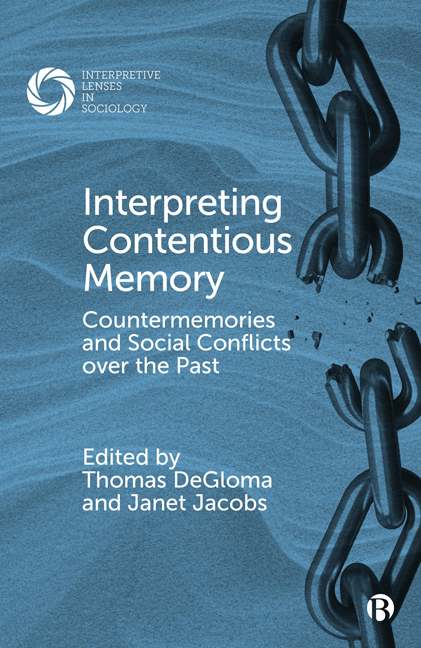Book contents
- Frontmatter
- Contents
- Series Editors’ Preface: Interpretive Lenses in Sociology – On the Multidimensional Foundations of Meaning in Social Life
- Notes on Contributors
- Acknowledgments
- 1 Introduction: Interpreting Contentious Memories and Conflicts over the Past
- PART I Interpreting Memories in the Social Dynamics of Contention
- PART II Racism, Exclusion, and Mnemonic Conflict
- PART III Genocide, Memory, and the Historicizing of Trauma
- Index
7 - Commemorations as Transformative Events: Collective Memory, Temporality, and Social Change
Published online by Cambridge University Press: 20 January 2024
- Frontmatter
- Contents
- Series Editors’ Preface: Interpretive Lenses in Sociology – On the Multidimensional Foundations of Meaning in Social Life
- Notes on Contributors
- Acknowledgments
- 1 Introduction: Interpreting Contentious Memories and Conflicts over the Past
- PART I Interpreting Memories in the Social Dynamics of Contention
- PART II Racism, Exclusion, and Mnemonic Conflict
- PART III Genocide, Memory, and the Historicizing of Trauma
- Index
Summary
In the late 2000s, contemporary observers were quick to identify Philadelphia, Mississippi, as ground zero of a nascent memory movement, a notable development given the city's dubious racial history. The community, situated in the state's east-central region, was notorious as the site of the 1964 “Mississippi Burning” murders of three civil rights workers – James Chaney, Andrew Goodman, and Michael Schwerner – and had long maintained a reputation as a “strange, tight, little town” for its citizens’ silence, denial, and obstruction of justice in the case (Nevin, 1964). For decades, travelers avoided the city and its surrounding county, Neshoba, out of fear of harassment or worse (Mars, 1977).
That began to change in 2004. Historians and racial justice practitioners were beginning to describe Philadelphia as a “beacon of racial reconciliation,” accolades that I heard repeatedly as I travelled throughout the state in 2009 to investigate efforts to establish a statewide truth commission. I would soon learn that an interracial coalition of citizens from Philadelphia and the surrounding county had coalesced in 2004 around the fortieth anniversary of the 1964 killings, ultimately calling for justice in the case. Such a group, let alone such a demand, would have been unthinkable just decades before when the mere suggestion would have likely provoked the retaliation of nightriders. Throughout the 1960s, the White Knights of the Ku Klux Klan exerted significant social control in Neshoba County, reinforcing white supremacy through intimidation and violence (Huie, [1965] 2000). Thus, given the history of racial violence in the county, the Philadelphia Coalition was an extraordinary development. Whether the fortieth anniversary commemoration spearheaded by the coalition would mark a turning point in the long-standing trajectory of public silence as many observers projected, however, remained to be seen.
Just 15 years before, in 1989, a similar interracial coalition of Neshoba Countians hosted a large-scale community-wide commemoration ceremony marking the twenty-fifth anniversary of the murders. They, too, identified the event as a critical juncture in its immediate aftermath, a turning point between past denial and present atonement. But these projections were short-lived. The 1989 commemoration, while not without reverberations, failed to transform local memory policies and practices.
- Type
- Chapter
- Information
- Interpreting Contentious MemoryCountermemories and Social Conflicts over the Past, pp. 134 - 153Publisher: Bristol University PressPrint publication year: 2023



